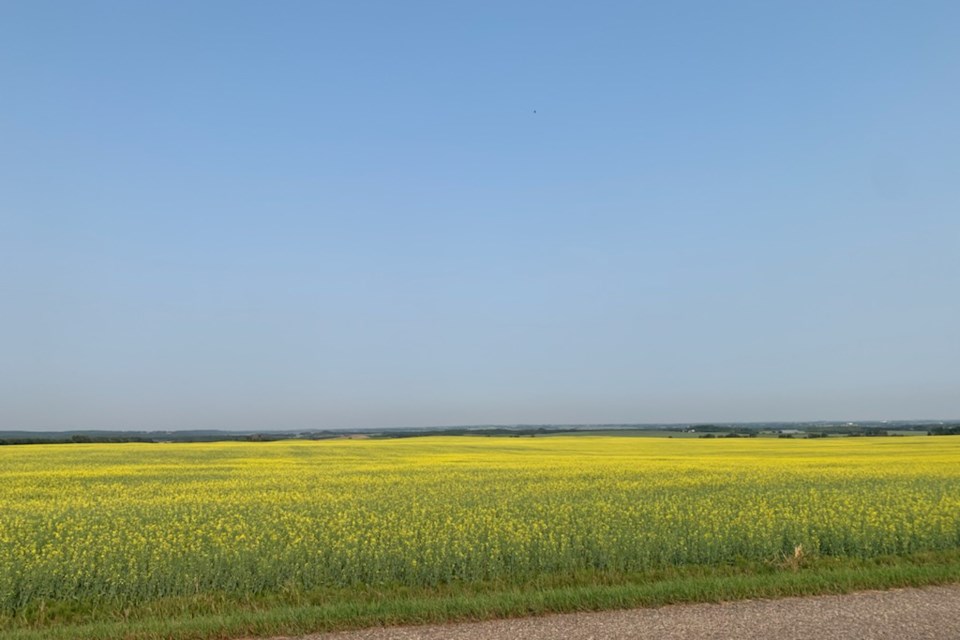ST. PAUL - The County of St. Paul is considering declaring a state of agricultural disaster following weeks of hot weather with very little precipitation received in some areas.
An "unprecedented weather situation" has resulted in plenty of concerns from local producers - a sentiment that was shared around the County of St. Paul council table during the July 13 regular council meeting. CAO Sheila Kitz spoke briefly about the possibility of declaring a state of agricultural disaster.
During Tuesday's meeting, it was noted that there are some specific conditions that need to be met in order for the municipality to declare a state of agricultural disaster, such as if the disaster is county-wide, and if it was in fact a long-term situation.
Reeve Steve Upham noted that due to the dry conditions and extreme heat being experienced in many areas of the county, producers are "losing tonnage by the day." But, he also noted that some areas do appear to be in better shape than others.
"It's mixed."
Kitz said she wasn't sure if the current situation would cover all the bases needed to declare a state of disaster.
Council agreed to direct administration to contact the Minister of Agriculture and Forestry to express concerns. The effects of the extreme weather are being felt by both grain and cattle farmers in the area.
A letter addressed to Minister of Agriculture and Forestry Devin Dreeshen, signed by Upham, and dated July 16 speaks to how the municipality is "very concerned about the effects the extended period of hot, dry weather is having on the crops in the province, particularly in northeast Alberta."
Some farmers are anticipating only five to 10 per cent of what they would normally harvest, due to drought, reads the letter.
Some areas of the county haven't seen any precipitation for over a month, wrote Upham. The reeve also wrote about concerns regarding timelines if producers choose to put their crop to an alternate use.
"AFSC (Agriculture Financial Services Corporation) has put out a bulletin that provides producers with information regarding what to do it they choose to put their crop to an alternate use. The bulletin provides for this to happen, but the producer will need to provide at least five days advance notice to AFSC in order to provide time for the crop inspector to attend the field to inspect the loss of production. This requirement is extremely problematic as we are experiencing several days of over 30 degree weather for the third week in a row."
He continued, "It will be imperative that producers be able to salvage crops by putting them to an alternate use such as pasturing, silaging, or baling as quickly as possible." Upham urged AFSC to allow producers to salvage crops now, in hopes of possibly assisting with the problems facing the livestock industry in finding enough feed for animals.
"It is estimated that hay crops are less than one third of previous year's production," wrote Upham. The reeve also acknowledged the mental health impacts brought on by the situation.
"The challenging weather conditions along with the pandemic is stretching the strength of these individuals that feed the world," wrote Upham, who also asked the province to advertise and promote the Crisis Text Line for Alberta, as well as the Mental Health Helpline (1-877-303-2642).
The day following last Tuesday's council meeting, some parts of the County of St. Paul received some brief, but much-needed rain. The temperature again reached near 30 degree Celsius later in the day.
A special council meeting could be called in the near future if the municipality decides to proceed with declaring a state of agricultural disaster, confirmed Kitz.
Province acknowledges the situation
On Thursday, the Government of Alberta released a statement regarding the dry conditions being seen in many parts of the province.
Minister Dreeshen said the provincial government "recognizes the significant impacts that extreme dry weather has on the province’s producers. Our government is standing up for Alberta farmers and ranchers to ensure they are supported through these extreme conditions."
He added, “I want to assure producers across Alberta that we understand the severity of this prolonged period of extreme dry weather and we are doing everything we can to ensure you receive the support you need."
The minister confirmed that a verbal commitment from Ottawa regarding a joint AgriRecovery program will be initiated to support areas in the Prairies affected by drought conditions.
“At the Federal-Provincial-Territorial Agriculture Ministers’ meeting, the Prairie provinces and Ontario raised the extreme dry conditions that are increasing costs and diminishing yields for farmers and ranchers," said Dreeshen. “The details of an AgriRecovery program are still being developed with industry and we will work with our provincial and federal counterparts to ensure that Alberta’s farmers and ranchers are supported."
One item discussed briefly during the County of St. Paul meeting was pushing for flexibility when it comes producers being able to salvage affected crops.
“I have advised Alberta crop adjusters to be flexible and complete early assessments with affected crop and hay land – for example offering alternative use of crops to address forecasted feed shortages in our livestock industry," said Dreeshen. “Alberta announced a 20 per cent reduction in insurance premiums this year. This allowed almost 400 additional farmers and ranchers to enrol in crop, pasture and forage insurance that protects against weather-related production loss," added the minister.
Producers also have the ability to rent pipe and pumping equipment from the province to help fill dugouts and other catch basins from nearby water sources for livestock.
The County of St. Paul declared a state of agricultural disaster in the past, including in November of 2019, when it was estimated that about 35 per cent of crops were still unharvested as of Nov. 26 of that year, due to a cold an wet fall. Also, one was declared in the summer of 2015 when dry conditions were experienced across the area.



